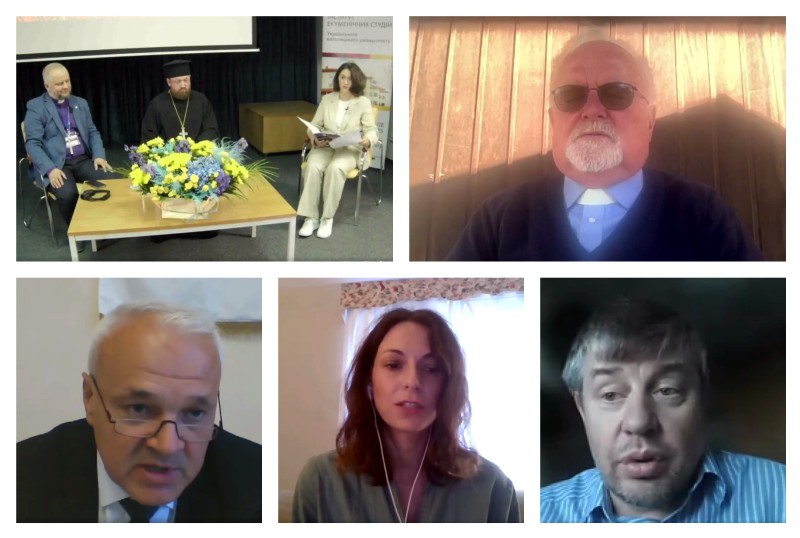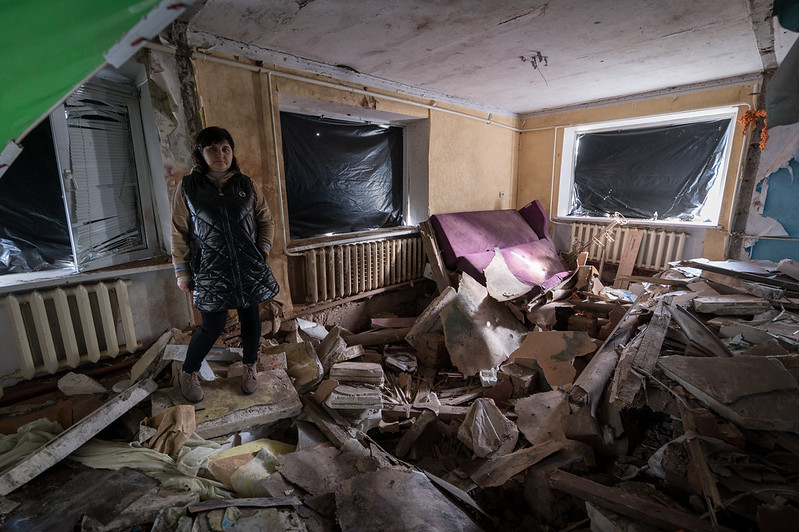
Press Release No: 18/23
10 October 2023
Brussels
How can churches build just peace in Ukraine? How can Ukrainian and other European Christians unite to encourage reconciliation in a war-torn country? How can churches be a witness to the truth? These questions were explored by Ukrainian church representatives in a hybrid panel in Lviv, Ukraine.
The panel was organised by the Conference of European Churches (CEC) on 6 October as part of its Pathways to Peace initiative, in close cooperation with the Institute of Ecumenical Studies of the Ukrainian Catholic University and the International Forum 16th Ecumenical Social Week. The moderator of the panel in Lviv was Dr Orysya Hachko Bila from the Ukrainian Catholic University.
The panel took place immediately following 5 October, when over fifty people were killed in one of the deadliest attacks in Kharkiv since the war began in Ukraine, according to media reports.
Bishop Sándor Zán-Fábián from the Reformed Church in Transcarpathia shared how such violence is incomprehensible. Yet, amidst violence, he stressed the important role of churches in “speaking the truth” to the establishment and the politicians. He said that even if few are listening to the churches, “we must focus on our commitment and obligation to peace and follow the truth.”
Ms Helga Dyatlik of the United World Mission said that a prerequisite of just peace is for the perpetrators of violence to be held responsible, along with the Christian values of forgiveness. She emphasised that Russia must be held responsible for war crimes in Ukraine.
“For lasting peace, churches and Ukrainians must work towards reconciliation. There is a deep divide in Ukrainian society that needs to be bridged. Therefore, churches who want to support reconstruction must forge dialogue, overcoming denominational divisions,” she added.
Fr Kiprian Lozinski of the Orthodox Church of Ukraine, highlighted how local churches are engaged in social service, raising funds, volunteering, supporting the military fighting at the frontline, as well as affected families, and offering spiritual assistance to those who are demoralised, wounded and hurt.
“The role of the Ukrainian Church is to help under all circumstances. The church can precipitate the victory and the coming of peace, offering hope to human hearts,” Lozinski said.

Just peace is a journey
“Just peace is more of a journey rather than a goal,” said Bishop Pavlo Shvarts of the German Evangelical Lutheran Church of Ukraine. In that journey, he said, churches must stand with those in need. “To cry with those who cry. To help those who need a new home, medicine or food. To be silent and pray with those who are bereaved. To listen to those who are in doubt and losing faith.”
Professor Volodymyr Bureha from the Ukrainian Orthodox Church shared how speaking about moral values, including forgiveness, is a difficult task for the churches. “How do you speak to the loved one of those who are being killed, how to achieve a sermon that moves toward reconciliation?”
Bureha went on to say that moral deterioration is, unfortunately, a dimension of war. “Therefore, the church needs to be aware that the Ukrainian society will need healing for generations to come. The trauma will not disappear in a short time. The church will need to be ready for the challenge.”
In his opening greetings, CEC General Secretary Dr Jørgen Skov Sørensen said, “If the Church should not gather in times of war, when should it gather?” He shed light on the history of the Conference of European Churches, born in 1959 out of the midst of the Cold War, witnessing to this reality.
Sørensen shared that, since the outbreak of the war, CEC has kept a close link to churches in Ukraine, providing them a forum from which to speak. He shared how CEC has conducted solidarity visits, online prayers, and emphasised the position of churches in the war among political leaders in Brussels.
Recently, CEC has welcomed the Orthodox Church of Ukraine as its full member.
Pathways to Peace is a coordinated response of the European church fellowship. It aims to strengthen synergy among churches and partners. Implementing a variety of events and projects, the initiative enhances the ecumenical vision of just peace, facilitating exchange among European churches, and promoting the voices of Ukrainian churches in the ecumenical debate.
Pathways to Peace builds cooperation between church leaders, intellectuals, and academics in preparation for peace in Ukraine. It engages in dialogue with European Institutions, addressing crucial political concerns, and advocating for the protection of destroyed religious sites in Ukraine.
Video: Panel “Pathways to Peace: Churches and the Role of Ecumenical Organisations”
Learn more about Pathways to Peace
For more information or an interview, please contact:
Naveen Qayyum
Communication Officer
Conference of European Churches
Rue Joseph II, 174 B-1000 Brussels
Tel. +32 486 75 82 36
E-mail: naveen@cec-kek.be
Website: www.ceceurope.org
Facebook: www.facebook.com/ceceurope
Twitter: @ceceurope
YouTube: Conference of European Churches
Subscribe to CEC news